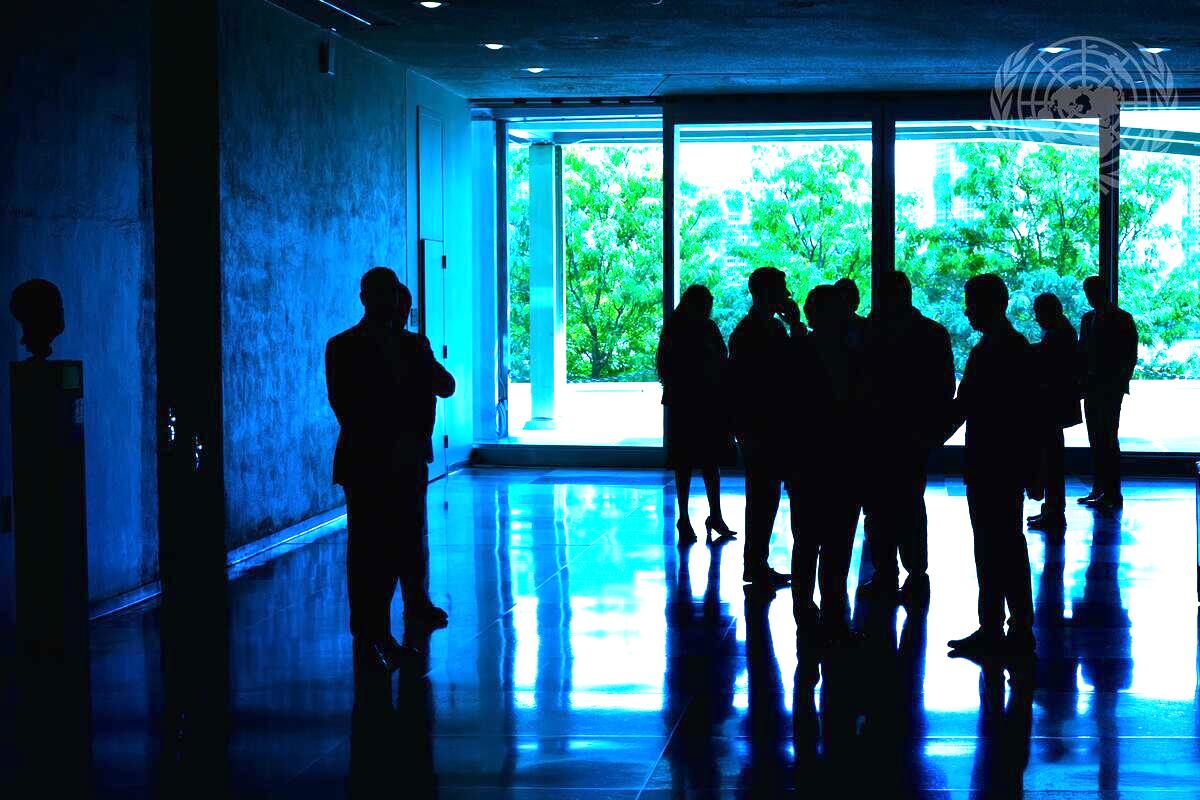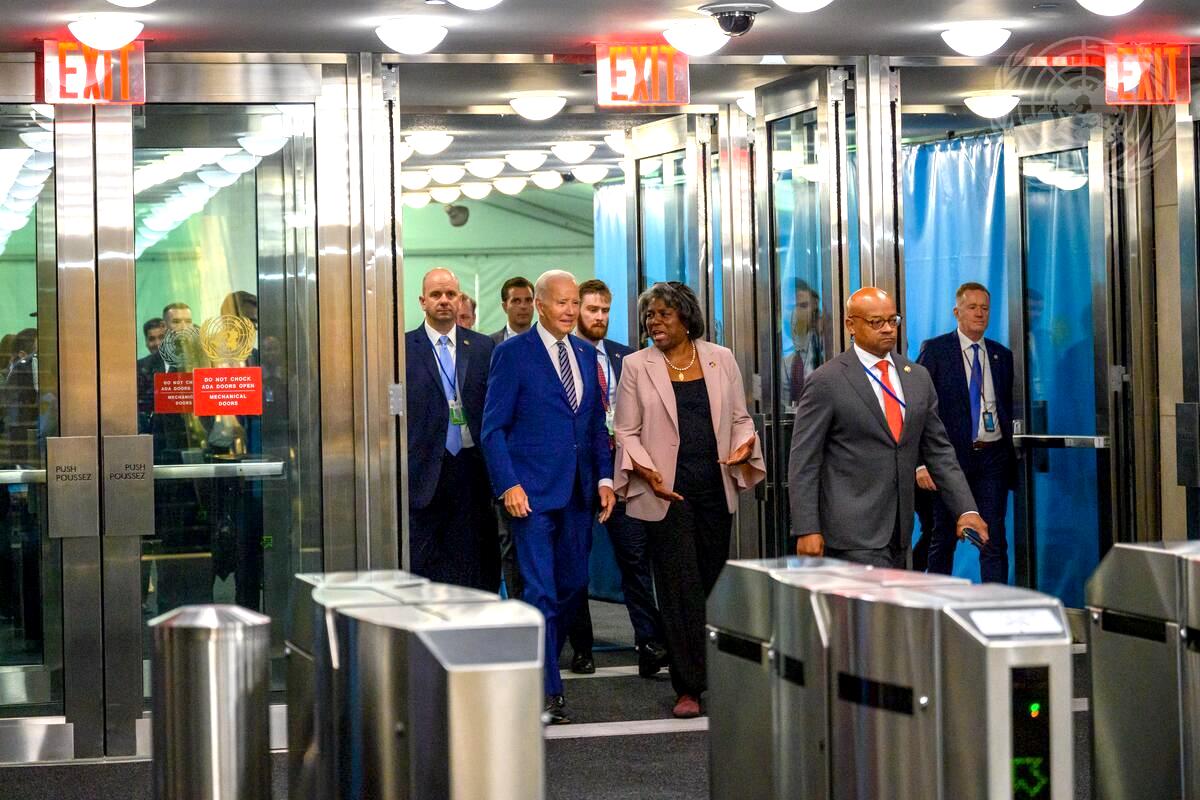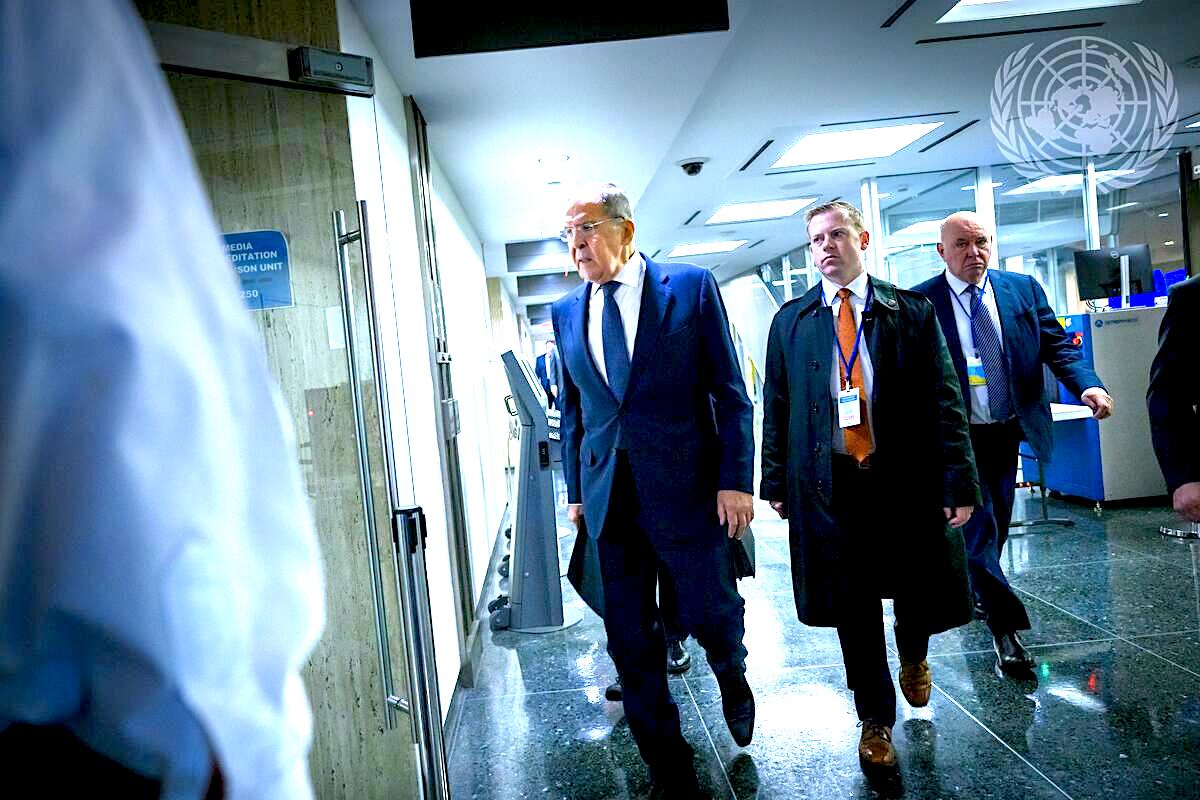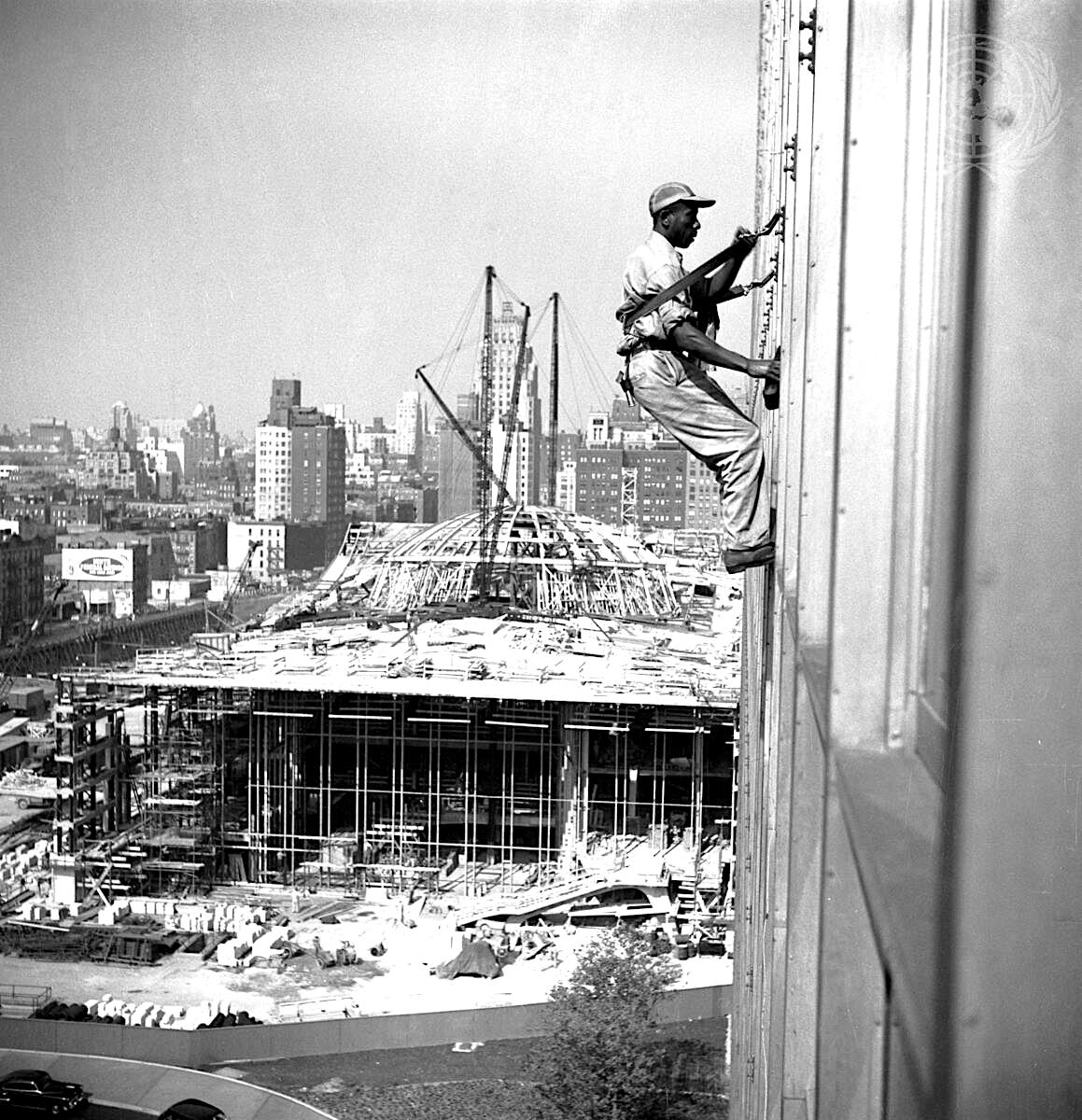Thomas G. Weiss says the U.N.’s highest priority should be reinforcing the system’s crumbling foundations.

Corridor at U.N. headquarters in New York on Sept. 23 during the 78th General Assembly. (UN Photo/Mark Garten)
By Thomas G. Weiss
PassBlue
 Parachuting into the frenzy of Manhattan’s East Side last week exposed the usual traffic snarls and not-so diplomatic cacophony about the United Nations. The noise included hackneyed pleas to alter the Security Council, often mixed with calls to draft a new Charter. Yet with current toxic politics, reform is a nonstarter.
Parachuting into the frenzy of Manhattan’s East Side last week exposed the usual traffic snarls and not-so diplomatic cacophony about the United Nations. The noise included hackneyed pleas to alter the Security Council, often mixed with calls to draft a new Charter. Yet with current toxic politics, reform is a nonstarter.
Conversations on First Avenue, like others this spring and scheduled for 2024 and 2025, can be interpreted as ambitious efforts to pursue reports from the secretary-general in 2021 and his high-level advisory board for effective multilateralism, in addition to civil society reports, as analytical grist for the SDG Summit a week ago, next year’s Summit of the Future and the World Social Summit in 2025. Even U.N. cheerleaders, however, have been heard to utter “death by summit.”
The inadequacy of current global problem-solving provides the drumbeat. What could be more obvious?
Equally obvious is the abysmal political climate for international cooperation, with deep rifts and mistrust, certainly the worst in my lifetime. The biggest war in Europe in decades is now mired in its 19th devastating month.
[Related: What Happened to the UN’s Ability to Mediate?]
In 1945, consensus existed about the world organization’s scope and priorities. Today, there is no agreement. Changes to the Charter follow, not precede, consensus. Optimists anticipating major changes ignore the polarized political reality displayed everywhere: growing rivalry among major powers; increasing disagreements within U.N. intergovernmental bodies; and backsliding on key normative and legal commitments.
Donate to CN’s Fall Fund Drive
Let’s mention recent illustrations of the confused and confusing reactions that result: the coups in Niger and Gabon this summer, the violent eruption in Sudan this spring, the full collapse of Sahelian stability right now, the expanding membership of the BRICS and G20 and no-shows at the annual General Assembly session by four of the five permanent members (U.S. President Joe Biden arrived from D.C.). Let’s not forget, too, the diffuse responses to economic inequalities, climate change, gender equality goals and the pandemic.
[Related: G20: Last Waltz in a World Torn Apart and BRICS: Global Center of Gravity Shifts]

U.S. President Joe Biden, center, arriving to address General Assembly on
Sept. 19. (UN Photo/Loey Felipe)
To understate my case, now is not the ideal moment for a second Charter. A revision agreed by two-thirds of the membership and their parliaments would be weaker than the current one. Would we really wish the growing throng of authoritarian leaders to lead the way?
I am puzzled by two topics that routinely go nowhere but are always prominent: Security Council reform and Charter Article 109. These remain articles of faith for many and stay omnipresent, especially before major five-year anniversaries. “We have reached a fork in the road,” Secretary-General Kofi Annan told the General Assembly in 2003. In the lead-up to the 60th anniversary, he hoped for a grand bargain, another “San Francisco moment,” which is no closer today than it was two decades ago.
That year, Washington Quarterly published an essay of mine, “The illusion of UN Security Council reform” that colleagues have periodically asked me to update. I have declined because the main change would be to the title — from “The Illusion” to “The Delusion of Security Council Reform.” That 95 percent of diplomatic energy is spent on this muddle baffles.
Less unsurprising was Biden’s tease this year at the U.N. General Assembly, repeating as he did in 2022 that “the United States would support expanding the Security Council,” while knowing perfectly well this will never happen.
Everyone agrees that the world has changed since 1945, though there’s not much else in consensus. All proposals — including Ukraine President Volodymyr Zelensky’s attempt to eliminate Russia’s permanent membership and veto — are not only impossible but also raise as many problems as they solve.
[Related: UN or NATO?]

Russian Foreign Minister Sergei Lavrov, center, on his way to brief reporters at U.N. headquarters on Sept. 23. (UN Photo/Loey Felipe)
We can count on more hope for the kinds of changes that occasionally raise the authority of the General Assembly, too long a backwater, and that finesse geopolitics. That is, there’s room to explore non-Charter changes.
My late friend Ed Luck and I disagreed on occasion, but on U.N. reform we both lamented that proponents are mesmerized by one “p,” namely process, but ignore another “p” — “product.” If only the process is improved, the logic goes, the product will too. It ain’t necessarily so. Moreover, the incessant wrangling and paralysis eliminate space to explore practical solutions. Adding permanent and elected members and fiddling with the veto could improve legitimacy. But would a mini-GA be more useful? Would even fewer decisions not result?
The weeping and gnashing of diplomatic teeth over several decades have not and will not enable new Charter amendments, but they have contributed to a permissive environment that has generated pragmatic modifications, such as the regular use of the Arria formula and embarrassing the veto wielders through the Liechtenstein initiative.
Member state flexibility has also led to adaptations and expansion of the U.N. system. If any founders from 1945 arrived in New York City now, they would not recognize the organization they created. I thus welcome exploring all ideas that exploit that permissive environment but shunt any thoughts about amending the Charter.
Will the inability to move ahead with dramatic Security Council reforms or Article 109 compromise U.N. credibility? No, or at least not more than in the past.
Maintenance

Window cleaner at work, outside the Secretariat building in 1951. In the background, the General Assembly Hall, then under construction, and the buildings of Midtown Manhattan. (UN Photo/JG)
To return to my opening thought, it is foolish to discuss reforming the U.N. while ignoring the brutal contemporary political realities. Instead, we should be strengthening the U.N.’s comparative advantages. Operationally, that involves better humanitarian action and fostering ideas surrounding global norms, principles and standards. Specifically, what about consolidating and centralizing the sprawling “system”?
Member states have added a lot to the bureaucracy but rarely subtract or close entities, although two large peacekeeping missions are being shut down faster than the administrators can manage.
The highest priority for the U.N. should be to reinforce the crumbling foundations of the U.N. system, not to speculate about the one we wished we had. The 2023, 2024 and 2025 summits will not solve bigger geopolitical problems. While unexciting, would it not be more sensible to brainstorm about worst-case rather than best-case scenarios? What about hard-headed contingency plans for what should remain in the system or even be expanded as well as what should be eliminated or consolidated if the organization were to have 10 to 25 percent fewer resources? That would sharpen the pencils.
I am not yet ready to give up on the U.N. However, rather than composing wish lists, we should be identifying the UN’s comparative advantages and building on what has succeeded. Otherwise, how long will the U.N. be standing in Turtle Bay?
For those who judge me overly dramatic and apocalyptic, I would like to recall that the League of Nations continued in rump form from 1939 to April 1946. Is that, in fact, a pertinent image for today’s U.N.? It is hard not to have ringing in my ears the words from Lord Robert Cecil at the final session: “The League is dead, long live the United Nations.”
Thomas G. Weiss is presidential professor of political science at the CUNY Graduate Center; distinguished fellow at the Chicago Council on Global Affairs; and global eminent scholar at Korea’s Kyung Hee University. His recent books include The ‘Third’ United Nations, with Tatiana Carayannis.
The views expressed are solely those of the author and may or may not reflect those of Consortium News.
Donate to CN’s
Fall Fund Drive



University classes I taught on International and Supranational Law and on International Organizations included a detailed study of why the United Nations superseded the League of Nations, instead of just reforming the League. The answer was clear. Unlike the author’s naïve opinion that consensus was attained in 1945, it was dictated by the victors of the second war to end all wars very much in the manner that the Treaty of Versailles was imposed on the losers of the first. The League was an obstacle to international autocracy and thus had to be “terminated”, and its assets, tangible and intangible, stripped. The League respected national sovereignty and each member was treated as an equal, not so with the United Nations, despite the premises and promises of its Charter. There was no veto by special member in the League although decisions had to be by consensus, i.e., unanimous (with the exception of parties to a dispute). In a sense, unlike the United Nations, it was democratic rather than an oligarchic dictatorship of usually squabbling elites. And the United States and the United Kingdom found that egalitarian democracy not only distasteful but abhorrent and unacceptable, hence they killed the League. Reform of the United Nations will prove virtually impossible, but at some point, based on precedent, its replacement may well prove essential if an equitable peace among equals is ever to be attained. Even if it does not include its most recalcitrant members, at first.
Until the UNelected is willing or even able to represent it’s member states instead of it’s real “owners” then it has no future. BRICS+ will keep attracting more members as will the SCO until it becomes rather too obvious that the UN cannot & does not serve any useful purpose anymore.
At this point, the UN is impotent except as a collaborator in war crimes.
See: hxxps://covertactionmagazine.com/2023/08/11/on-the-brink-of-world-war-does-the-un-still-have-a-raison-detre/
First things first…Move the UN out of the US and back to Switzerland – out from under the American boot.
moving from US to switzerland is like not moving it at all; Switzerland is a fantastic country in creating an image far from the actual truth; there is a reason why Switzerland is called “US’ little sister”, and the little sister is way worse than the big brother…
Switzerland has accumulated its immense wealth by serving the most powerful and often the worse nations, organizations, and humans; it is in the Swiss DNA to serve whomever is powerful, regardless whether evil or less evil; they call it pragmatism in Switzerland, since it is an extremely resources poor country…
Switzerland is an “engineered nations” genuineness is long dead in that country as it is humanity (serving only a facade and a way to secure resources in poor countries).
If UN has to survive, the HQ must away fro US and Switzerland to got to SA or another non western region
Fantastic comment ! But this is not a disease that afflicts just Switzerland many others in the collective West and across the First World and pretenders to that status would easily fit the bill as well. They have been tagging tightly to Western coat-tails for easy money for far too long until the US itself decided to piss them off for good !
I agree except I would rather it be moved to a country in the global south which has no permanent member.
This is clearly an eye-openning piece on the miscarriage of any prospective UN reform in the near future. The parallel drawn to the League’s predicament is quite valid. What was then “League is dead and long live the United Nations” should be rephrased thus : Security Council is dead and long live Coordinating Nations, wishfully that is. Actually reform need not wait for total consenses to put on track ; the UN itself was intially a victors’ CLUBbing, remember. Surely humanity ought to do better today !
The reality is that the UN has exactly the same problem that the League of Nations had. The inability to control the major powers. Indeed, the US has totally suborned any number of UN agencies. One could probably credibly claim that the UN has become the vassal of the US. I would suggest that the first thing the UN needs to do is to regain its credibility. Then we can discuss, for example, all these unilateral sanctions around the world.
Well said Jeff, but you are forgetting that the UN itself is applying too many of these sanctions either arbitrarily or at the behest of it’s controllers.
The UN could start by either changing its name to reflect its actual activities, or start working to ‘unite’ the world. The latter seems to be an alien concept, particularly to its western controllers who don’t want to accept multipolarity.
To the extent that the UN resists reform it undermines its own existence. Of course, for the US and the Anglo-Saxon alliance, that’s just fine. Nonetheless, the world is moving on and if the UN does not keep up new institutions that fairly represent all the nations of the world equally will emerge. It’s the Western alliance will be left in the backwater.
In any case, obviously, the Western powers cannot remain in control of the UN. Look where they have taken it and us. It is a compromised setup and they are demonstrably not up to the task of managing an inclusive world order.
UN will be a great tool for the west, a regional supranational organization that settle internal disputes between western countries and solves their human rights and environmental issues; that’s probably its destiny after being replaced by a “world council” with “multi-polarism” as the basis of its organizational culture.
Unless, by some miracles, UN unexpectedly solves the war in Ukraine, bringing peace and agreements; then perhaps, it can be saved; and yet, I doubt that UN would want to be saved if that is the only chance available to prove its worthiness and value.
What UN need is results not reforms, as the results will automatically bring about the necessary reforms it needs to stay alive because to get things done UN must free itself from who controls it.
The world of good words, eloquent speech, Biden’s white teeth is about to be “cancelled”, people have grown tired of pretense, propaganda, politicization of anything and everything; they want to see results and facts, how can you blame them?
The U.N. is essentially a bureaucracy. Same with NATO. After a few decades no matter what their mission statement says, the organizations are run by and for the permanent employees. It takes a very strong willed outsider to make a difference. Trump was the ultimate strong willed outsider and although he certainly ruffled a lot of feathers not much of permanent change occurred. With 4 years of “experience” under his belt and a better understanding of what he’s dealing with, a 2nd term might well have more success against the bureaucracy.
As the 2024 election gets closer so will the hysterics of the bureaucrats and Deep Staters around the world.
“Biden’s white teeth” My dentist in Tokyo had a poster of Joe and Jill Biden displaying their excellent teeth. I suppose they wanted the extra cash from posing for an advertisement.
No 80 year olds look like that naturally. I’d like to shake their surgeon’s hand.